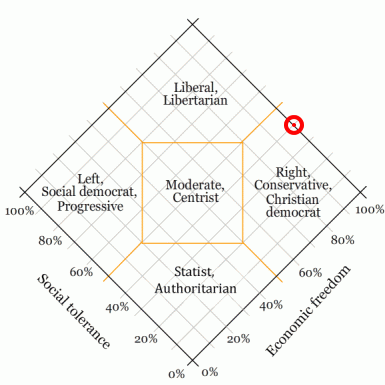Ce orientare doctrinară au cititorii, comentatorii și autorii Blogary? Faceți testul Freedom Talk.
Primul număr e punctajul la toleranță socială, al doilea e punctajul la libertate economică.
Conservatori/creștin democrați: Bleen (40-100), Amelia New (20-80), OstapB (20-70), Roșu (30-80), Audax (40-80), Claudinho (40-90), taxi_driver (10-90)
Libertarieni/liberali: VBKiler, Gramofonu (70-80), Aaragn (60-100), BogdanL (80-100), Adina (60-90), Abis (90-90), Mycroft (90-90), Misha Pn (70-70), Kozmo Nautu (90-100), Bogdan Iulian (60-90), 2visible
Centriști/moderați: SimonaM (60-70), Sam85, Rheia (60-70), Meioza (60-60), DenisaC (60-60),
Acum doi ani, în aprilie 2011, am făcut testul Freedom Talk pe Blogary. Îl reluăm pentru cei care nu l-au făcut atunci, dar și pentru cei care vor să facă comparație între ce cred acum și ce credeau acum doi ani.
În ceea ce mă privește, sînt consecvent. Scorul atunci a fost 30 puncte la toleranța socială și 100 puncte la libertatea economică. L-am refăcut și acum am avut 40 de puncte la toleranța socială și 100 de puncte la libertatea economică. Am îmbătrînit, sînt mai tolerant.
Iată cum stau eu:
Adică sufăr de conservativită.
Diagnosticul detaliat:
What is freedom?
This is how you understand the concept of freedom. The seven varieties of freedom on the left are not equally intuitive to you: the hierarchy describes what you are most likely to think about in a given situation when the issue of freedom is at stake.
The three oppositions below, show whether you are likely to adopt an individualistic perspective or a communitarian one; whether you think in terms of lacking constraints (negative) or in terms of ability to do things or having access to things (positive); and whether you associate freedom with having flexible rules that change depending on the outcomes you aim for or, on the contrary, with fixed and predictable procedures for doing things, the same for everybody.
If the world was here just to please you
This is what you think best serves your interest. Do you ever prefer to have less freedom? To find out, compare your understanding of the concept (above), with what turned out to be your hierarchy of preferences (on the left).
The three oppositions below also reveal what you usually like: to be treated as an unique individual or as a member of your community; to be left alone to just do your stuff or to be provided with options and benefits (even if this requires you to accept certain constraints); and whether you consider the existence of fixed and equal rules to be to your advantage.
What you think best promotes the common good
This is what you think best promotes the common good on the long term. Do you see the interests of the community ever coming into conflict with freedom? And to what extent are your personal interests in line with what’s best for the community as a whole? To find out these things compare the results on the left with the previous hierarchies.
The three oppositions also show what you think best serves the common good: whether individual independence serves the community as well; whether the common good is achieved by means of eliminating the constraints on people or, on the contrary, by focusing on the available benefits and options; and whether the flexibility of rules endangers the community.



http://freedom-talk.com/profile/5392 (80/100) – Libertarian
Libertarian (Classical liberal)
Right (Conservative, Christian democrat)
http://freedom-talk.com/profile/5318
Right (Conservative, Christian democrat) Sunt la fel ca data trecuta. In minoritate 😉
Right (Conservative, Christian democrat) http://freedom-talk.com/profile/5274
Momentan, scorul e așa:
Libertarieni: 10 (27 data trecută)
Centriști: 5 (23 data trecută)
Conservatori: 5 (19 data trecută)
Libertarian (Classical liberal) http://freedom-talk.com/profile/5255
raspunsurile sunt relativ usor de dat, mai dificil e daca trebuie sa te porti asa in realitate
Mi se pare mie sau conservatorismul implica intoleranta?
Gramofonu doar intoleranță socială… adică chemi poliția dacă vecinul pune manele la maxim noaptea pe la 3
eu am iesit libertarian (ma asteaptam oarecum), aproape in colt (asta nu ma mai asteptam) 🙂
90 la libertate sociala, 100 la libertate economica – WOW !!!
http://freedom-talk.com/profile/5230
http://freedom-talk.com/profile/5226 (70-70)
Eu am ajuns la gradul de nesimţire la care mă sună stomatologu’ să-mi bată obrazu’ că n-am mai fost la control de cam de multişor, iar tu mă pui să-mi refac analizele politice. Uăf! 😀
Right (Conservative, Christian democrat) 80% liberatate economica, 40% toleranta sociala. Exact la fel ca acum vreo doi ani cand am mai facut testul.
2. What is freedom? Freedom under law 83%. Psychological autonomy75% . Freedom of choice 50%
3. If the world was here just to please you. Freedom under law 83% . Psychological autonomy 67%. Welfare 50%
4. What you think best promotes the common good. Freedom under law 92% . Psychological autonomy 75% . Political freedom 50%
Mai liberal decat acum 2 ani
http://freedom-talk.com/profile/5194
Classical liberal : http://freedom-talk.com/profile/5151
Asa ma si asteptam sa iasa
Cum credeam, „Moderate (Centrist)”, cu scorul de 60-60: http://freedom-talk.com/profile/5166
În vară, căci atunci am descoperit acest sait, tot datorită blogary, scorul era cam la fel.
Nu-mi place, că au texte cel puțin dubioase „Due to moral reasons, vegans refuse to eat meat or any animal products”.
Altfel sînt centrist cum mă știu: http://freedom-talk.com/profile/5178 (deși după poză, pare că încep să am tendințe libertariene)…
Individual vs. Community 56% – 44%
Negative vs. Positive 13% – 87%
Procedures vs. Outcomes 61% – 39%
meioza La fel, accept rezultatul global, dar unele întrebări mi se par foarte specioase. În plus, rezultatul se bazează pe ce afirmi despre tine, nu pe întrebări de tip: cu ce te ocupi, cum îţi câştigi şi îţi cheltui banii, etc.
Libertarian (Classical liberal ) cu scorul de 60 – 90: http://freedom-talk.com/profile/5172. Ma asteptam sa ies Right, Conservative de cand citesc Blogary. Observ ca mi-am pastrat orientarea politica (estimata de mine, nu prin teste inteligente) din epoca pre-Blogary.
adina 90-60-90?
Observ acuma ca in general cine e conservator se… conserva 🙂 Ceilalti oscilati sau fandati 🙂
Eu am ieșit de data asta 60-70, la fel ca SimonaM . Data trecută picasem pe aceeași crăcuță cu Gramofonu. Nu știu ce (mi) s-a schimbat. Că scîrba de stîngisme mi-a rămas nealterată.
Rheia SimonaM Gramofonu
Io știu de la ce rezultatul meu… Unele întrebări mi s-au părut cam confuze. Adică m-am dus categoric pe ”habar n-am”. Presupun că de-acolo 😀
Dar unde vezi tu stângisme?! Că și io am silă de ele..
SimonaM Rheia Gramofonu Păi nu văd nici un stîngism la tine, SimonaM. Așa s-a înțeles? Înseamnă că iar n-am dormit destul azi-noapte. Scuze!
Rheia SimonaM Gramofonu
Nuuu, n-am zis că la mine. LOL. Deși se putea interpreta – prin asociere :))
Nu înțelegeam de unde referirea la stângisme, că zici că suntem pe același punctuleț 😉
SimonaM Rheia Gramofonu Acum că mi-ai atras atenția, m-am uitat mai inginerește la chestiune. Ai dreptate, dacă am scăzut de la 80/80 la 60/70, de fapt mi-a scăzut, nu mi-a crescut, toleranța socială! Și, că tot veni vorba, moi aussi am dat o grămadă de Nu știu/Nu se aplică.
Ha! M-am conservat!
30-80, Right Conservative, Christian-Democrat… Ce surpriza 😛
Nu stiam de testul asta, foarte tare.
Credeam ca-s libertarian dar cand colo ce sa vezi Moderate (Centrist).
😀
Sam85 La mine a fost invers :))
Libertarian (Classical liberal) – http://freedom-talk.com/profile/5142
Your main understanding of freedom rests on these concepts.
1. Freedom from constraints
83%
2. Freedom of choice
75%
3. Psychological autonomy
58%
This is how you generally like things to be.
1. Freedom of choice
67%
2. Freedom under law
67%
3. Psychological autonomy
67%
This is what you think best helps society on the long term.
1. Freedom under law
67%
2. Freedom from constraints
50%
3. Psychological autonomy
50%
Individual vs. Community
56% – 44%
Negative vs. Positive
27% – 73%
Procedures vs. Outcomes
62% – 38%
Eram Right (Conservative, Christian
democrat) in 2011.
Sunt Libertarian (Classical liberal) acum http://freedom-talk.com/profile/5133.
BogdanL E de bine, te-ai vindecat 🙂
Gramofonu Se pare ca vine cu varsta. Cu cat strangi mai multe jucarii, cu atat te deranjeaza mai tare cand cineva crede ca are un drept sa se joace cu ele, numai fiindca tu ai mai multe 🙂
Mdeci la ora asta sunt tot Moderate (Centrist) 60-70. Și cu o durere de cap.
http://freedom-talk.com/profile/5157
Libertarian (Classical liberal)
http://freedom-talk.com/profile/5145
Ca rezumat – se pare ca nu dau 2 bani pe politic, in schimb dau 2 bani pe comunitate si restul pe drepturile individuale 🙂
Tolerant sint (spre „mi se filfiie de toti cit timp stau in curtea lor”), nu simt nevoia acuta sa fiu tolerat sau protejat.
Punct sensibil: „don’t fuck with my fish eggs”. Or else.
Adica mai pe romaneste (la capitolul sensibilitati): Psychological autonomy, Freedom of choice
Right (Conservative, Christian democrat) : 20 – 80 (acum); in 2011: 30 – 70 (am intinerit, sunt mai intoleranta – sic!)
http://freedom-talk.com/profile/5139
Nimic nou sub soare
„Your political orientation: Libertarian (Classical liberal)”
În 2011 eram așa: http://freedom-talk.com/profile/1359
Cum reușesc să găsesc o fereastră, încerc să văd și azi cum stau.
Scrieți în comentarii rezultatele și apoi le vom adăuga în articol.